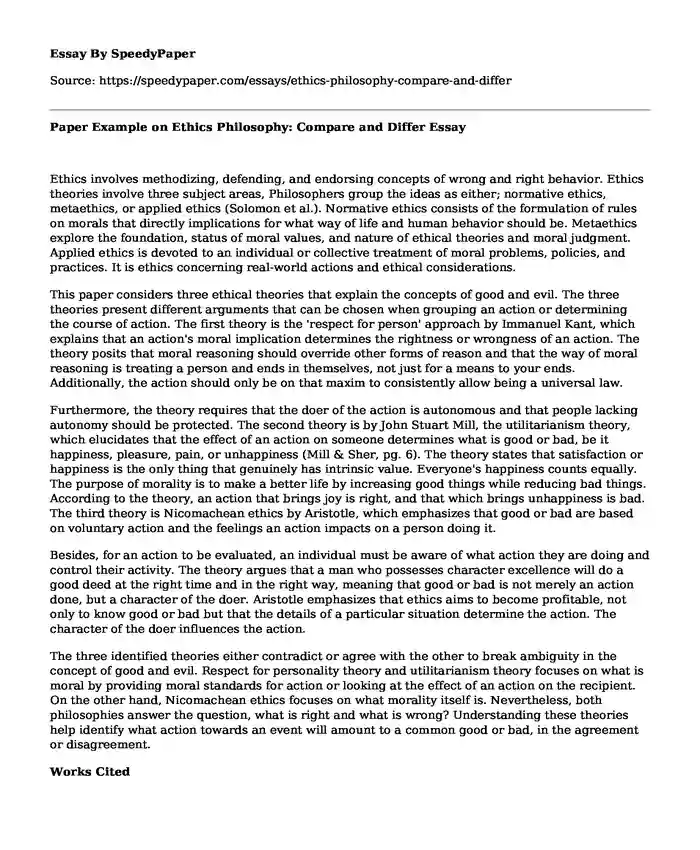
| Essay type: | Compare and contrast |
| Categories: | Philosophy Ethics |
| Pages: | 3 |
| Wordcount: | 575 words |
Ethics involves methodizing, defending, and endorsing concepts of wrong and right behavior. Ethics theories involve three subject areas, Philosophers group the ideas as either; normative ethics, metaethics, or applied ethics (Solomon et al.). Normative ethics consists of the formulation of rules on morals that directly implications for what way of life and human behavior should be. Metaethics explore the foundation, status of moral values, and nature of ethical theories and moral judgment. Applied ethics is devoted to an individual or collective treatment of moral problems, policies, and practices. It is ethics concerning real-world actions and ethical considerations.
This paper considers three ethical theories that explain the concepts of good and evil. The three theories present different arguments that can be chosen when grouping an action or determining the course of action. The first theory is the 'respect for person' approach by Immanuel Kant, which explains that an action's moral implication determines the rightness or wrongness of an action. The theory posits that moral reasoning should override other forms of reason and that the way of moral reasoning is treating a person and ends in themselves, not just for a means to your ends. Additionally, the action should only be on that maxim to consistently allow being a universal law.
Furthermore, the theory requires that the doer of the action is autonomous and that people lacking autonomy should be protected. The second theory is by John Stuart Mill, the utilitarianism theory, which elucidates that the effect of an action on someone determines what is good or bad, be it happiness, pleasure, pain, or unhappiness (Mill & Sher, pg. 6). The theory states that satisfaction or happiness is the only thing that genuinely has intrinsic value. Everyone's happiness counts equally. The purpose of morality is to make a better life by increasing good things while reducing bad things. According to the theory, an action that brings joy is right, and that which brings unhappiness is bad. The third theory is Nicomachean ethics by Aristotle, which emphasizes that good or bad are based on voluntary action and the feelings an action impacts on a person doing it.
Besides, for an action to be evaluated, an individual must be aware of what action they are doing and control their activity. The theory argues that a man who possesses character excellence will do a good deed at the right time and in the right way, meaning that good or bad is not merely an action done, but a character of the doer. Aristotle emphasizes that ethics aims to become profitable, not only to know good or bad but that the details of a particular situation determine the action. The character of the doer influences the action.
The three identified theories either contradict or agree with the other to break ambiguity in the concept of good and evil. Respect for personality theory and utilitarianism theory focuses on what is moral by providing moral standards for action or looking at the effect of an action on the recipient. On the other hand, Nicomachean ethics focuses on what morality itself is. Nevertheless, both philosophies answer the question, what is right and what is wrong? Understanding these theories help identify what action towards an event will amount to a common good or bad, in the agreement or disagreement.
Works Cited
Solomon et al. Introducing Philosophy: A Text with Integrated Readings. New York: Oxford UP, 2020. Print.
Mill, J, S. & Sher, G. (2002). Utilitarianism. 2nded. Hackett Publishing.
Cite this page
Paper Example on Ethics Philosophy: Compare and Differ. (2023, Dec 30). Retrieved from https://speedypaper.net/essays/ethics-philosophy-compare-and-differ
Request Removal
If you are the original author of this essay and no longer wish to have it published on the SpeedyPaper website, please click below to request its removal:
- Free Essay on the Recent Journal Article on Ethical Dilemmas in Nursing
- Aristotle Response to the Article.Philosophy Essay Example.
- Philosophy Essay Example: Descartes and His Theory
- Essay Sample: Theoretical Perspective and the Intervention Phase
- Free Essay: Description of Moral and Ethical Issues
- Essay Example: The Ethical Issues of Getting Information by Hacking
- Free Essay - Medical Assisted Suicide
Popular categories




